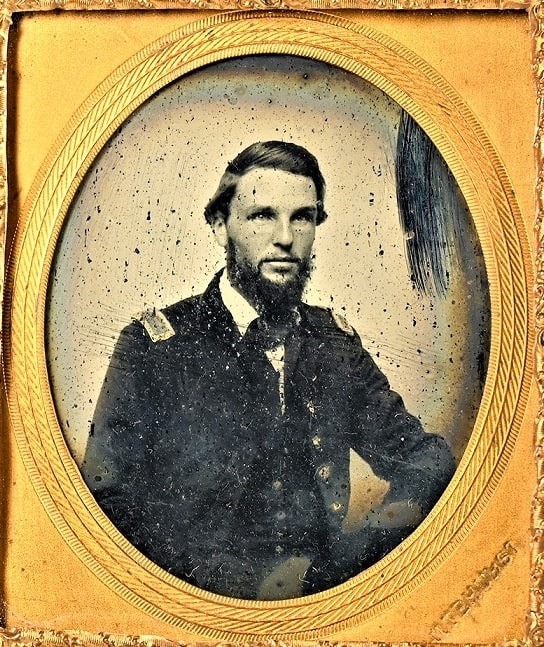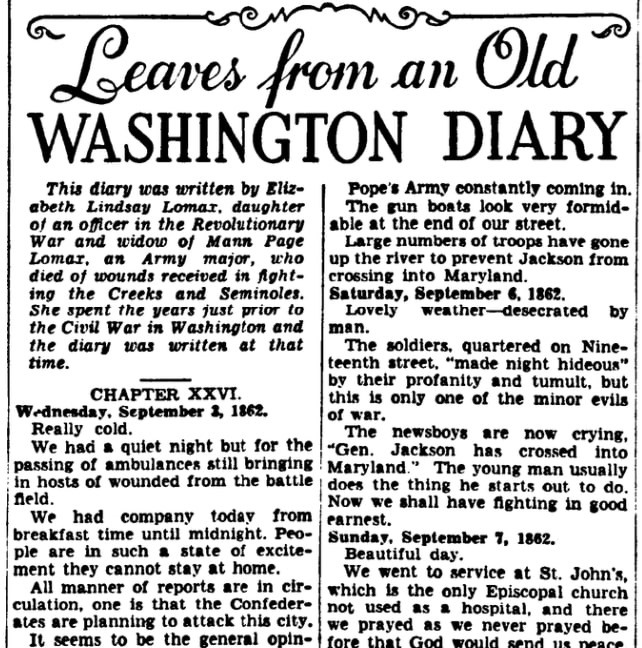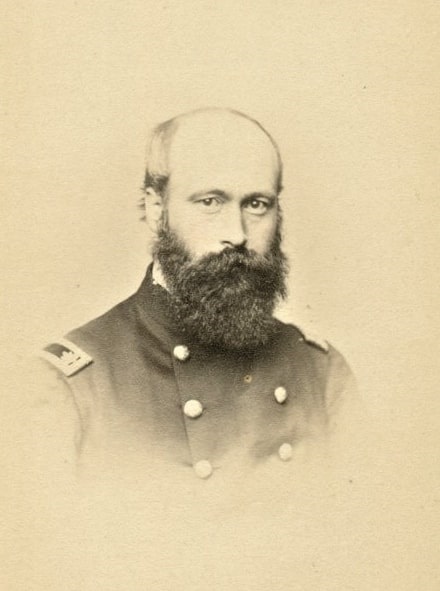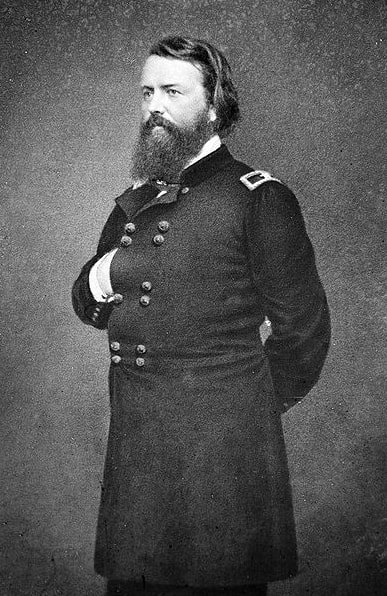Introduction: In this article, Melissa Davenport Berry continues her series on descendants of the Jamestown settlers, focusing on Civil War diarist Elizabeth Virginia Lindsay Lomax. Melissa is a genealogist who has a blog, AnceStory Archives, and a Facebook group, New England Family Genealogy and History.
“The Penny Post brought me a pencil note from my dear son, the first I have had for an eternity. Said he had been ordered to Virginia, dear boy, he had no doubt thought that would delight my soul, but I do not know whether to be glad or sorry. Every inch of Virginia seems to be a battleground at the present moment.”
–Elizabeth Virginia Lindsay Lomax, Washington, D.C., Wednesday, 24 September 1862
Today I continue with my “Jamestown Descendants: Who’s Who” series, focusing on the Lindsay-Lomax and allied family lines of Old Virginia who descend from Jamestown settlers.
The above narrative is from the personal diary of Elizabeth Lindsay Lomax (1796-1875), entitled Leaves from an Old Washington Diary 1854-1863. Elizabeth is referencing her son, Lunsford Lindsay Lomax, called to Virginia to serve in the Confederate Army. In 1863 he was promoted to the rank of brigadier general, and became a major general in 1864.
Lunsford was a direct descendant of Jamestown’s William Tayloe, Henry Corbin, Hugh Gwyn, Ralph Wormeley, and Thomas Lunsford.

The diary was edited and published in 1943 by Elizabeth Lindsay Lomax Wood, daughter of the above Gen. Lomax and Elizabeth Winter Payne. She was the wife of Waddy Butler Wood, son of Charles Wood and Clara Forsythe Hargraves.
The diarist Mrs. Lomax was born to Capt. William Lindsay and Mattie Fox in Virginia on the family estate “Lindsay’s Mills,” near Port Royal. Her father commanded a company in the light horse calvary of Harry Lee during the American Revolution.
She married Mann Page Lomax (1787-1842), born in Port Tobago, Virginia, to Thomas Lunsford Lomax and Anne Corbin Tayloe.
In her diary, Mrs. Lomax, a widow with six children, offers excursions into a period in history addressing the social, economic, and political conflict of a civil war and the many torn loyalties it brought.
The Lomax family’s social circles included prominent Southerners such as: Robert E. Lee and his sons; Paul Jones Semmes and his cousin Raphael Semmes; and two Virginia governors, Henry Alexander Wise and John Buchanan Floyd.
Others in their social circle were loyal Yankees, yet strong ties remained. Among them were: President Franklin Pierce, who came to her financial aid; and Union Gen. George Dashiell Bayard, of whom she wrote, “[He] is a dear and almost like a son to me.”
Bayard was Lunsford’s roommate at West Point and stayed with the family often. The friendship between him and Lunsford was the kind of bond that “neither time, a woman, nor war could destroy.” However, like many tragic losses, Bayard was wounded in the Battle of Fredericksburg and died the next day, 14 December 1862.
Some of her diary pages were featured in the Evening Star.

The introduction to this article read:
This diary was written by Elizabeth Lindsay Lomax, daughter of an officer in the Revolutionary War and widow of Mann Page Lomax, an Army major, who died of wounds received in fighting the Creeks and Seminoles. She spent the years just prior to the Civil War in Washington and the diary was written at that time.
The article included a number of entries from Lomax’s diary, including the following:
Wednesday, September 3, 1862.
Really cold.
We had a quiet night but for the passing of ambulances still bringing in hosts of wounded from the battlefield [Battle of Chantilly].
We had company today from breakfast time until midnight. People are in such a state of excitement they cannot stay at home.
All manner of reports are in circulation, one is that the Confederates are planning to attack this city.
It seems to be the general opinion that Washington is to be destroyed – either by friend or foe.
The gun boats have moved up to the aqueduct. The Federal Army occupies the fortifications, and all looks warlike.
I feel much concerned at the thought of my house being battered down, myself and [my] children thrown destitute on the world, but if our cause is triumphant I shall not murmur.
It is said that Gen. [“Stonewall”] Jackson with a large force has gone to Pennsylvania.
Dr. [Charles] Page has been taken a prisoner by the Confederates. Emily [nee Carmichael] Page is staying with us, is very miserable about her husband.

[Charles Page (1829-1906) was the son of Washington Craig Page and Elizabeth Ann Claggett, and a descendant of Jamestown’s Page, Carter, Wyatt, Armistead, Tayloe, Gwynn, Randolph, Beverley, Dabney, Reade, Martiau, and Burwell lines. He and his wife Emily left descendants.]
Thursday, September 4, 1862.
Beautiful autumn day.
The United States are in my debt to the extent of $540 [$15,325 today] this day. Although I have no winter fuel, and my necessities very great, with no money to supply these needs, and by taking the oath of allegiance I could draw the amount due me – never will I sacrifice principle to interest and disgrace my children and ancestry.
Excitement still continues.
Popes’ army [Union Gen. John Pope] constantly coming in.

[John Pope (1822-1892) was the son of Nathaniel Pope and Lucretia Backus, and a descendant of Jamestown’s Edwards, Willoboughty, and Robinson lines. He married Clara Pomeroy Horton.]
The gun boats look very formidable at the end of our street.
Large numbers of troops have gone up the river to prevent Jackson from crossing into Maryland.
Saturday, September 6, 1862.
Lovely weather – desecrated by man.
The soldiers, quartered on Nineteenth street, “made night hideous” by their profanity and tumult, but this is only one of the minor evils of war.
The newsboys are now crying, “Gen. Jackson has crossed into Maryland.” The young man usually does the thing he starts out to do. Now we shall have fighting in good earnest.
To be continued…
Explore over 330 years of newspapers and historical records in GenealogyBank. Discover your family story! Start a 7-Day Free Trial
Note on the header image: Civil War-era cannons, Fort Stevens, NW, Washington, D.C. Fort Stevens was part of the extensive fortifications built around the city during the American Civil War. Credit: The George F. Landegger Collection of District of Columbia Photographs in Carol M. Highsmith’s America; Library of Congress, Prints and Photographs Division.
